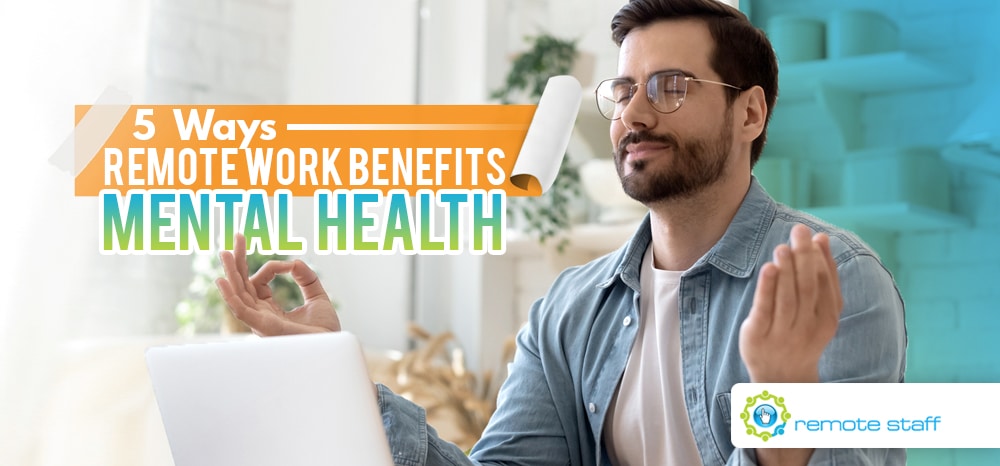We’re about more than a year into a global pandemic. There is light at the end of the tunnel, but there’s no denying that no one is getting out of this unscathed.
While those of us who remain alive and healthy are grateful, I’m sure we’ve all been struggling mentally in some way. We humans are social creatures, after all, and the relentless barrage of bad news for more than a year can take its toll on our minds.
Many of us have also been working remotely for some time now. While it can be isolating, especially if you’re used to working alongside colleagues in an office, it remains the safest option for anyone who can avail of it at this time.
Here’s five ways in which remote work is also good for people’s overall mental health too:
1.) Removes the need for commuting.

I know lots of people who love their jobs. The commute to and from work, however? Yeah, not so much.
This is especially true in the Philippines, where public transportation leaves a lot to be desired. Here, plenty of workers cram into trains and buses two hours before work actually starts. They then repeat the process at the end of the day, as they go back home.
Enduring a long, arduous commute every day is toxic. Some of them report feeling drained even before they set foot in their offices.
Remote work renders commuting unnecessary, enabling people to take back control of their time – as well as their mental energy reserves.
2.) Extends opportunities to economically-disadvantaged areas.

Prior to remote work, people had to crowd into big cities if they wanted to get ahead. Those who couldn’t and were otherwise stuck in rural or underdeveloped areas often missed out on better opportunities.
In addition, parents who wished to provide a good life for their children often had to leave home, sometimes even for another country. You can imagine how long periods of isolation can affect a person’s mental health.
Remote work, on the other hand, is location-independent. So long as a person can do the job and has a stable internet connection, it doesn’t matter where they live. This, in turn, gives people hope and can potentially improve their quality of life.
3.) Reduces work-related stress.

While it can be more lively to work in an office, certain factors can also make it more stressful. These include distractions (e.g., loud coworkers, prolonged chats by the water cooler, etc.), office politics, and workplace gossip.
When you work remotely, these factors are greatly lessened, if not completely eliminated. Remote work puts the emphasis squarely on productivity and results, so there isn’t much time for idle gossip. (Not what you’d want to get caught indulging in such, what with chat/email logs and screenshots serving as proof.)
Working at home also allows you to set up your workplace as you see fit. You can then bring in ergonomic furniture or even your favorite houseplants for maximum comfort. Best of all, you can work as quietly as you want or blast whatever music gets your creative juices flowing.
4.) Allows for more inclusivity in the workplace.

Remote work makes it possible for disadvantaged people to cultivate meaningful careers in ways that the traditional workforce never could. We’re talking about stay-at-home parents, the disabled, the elderly, and so on.
The work from home (WFH) set-up provides them with enough flexibility and comfort to contribute their unique talents and perspectives to the workplace. Most importantly, it provides them with a semblance of economic autonomy as well as a voice with which to be heard.
5.) Provides for better work-life balance.

No list about remote work’s mental health benefits would be complete without this. Thanks to its largely flexible nature, remote work allows one’s personal and professional life to coexist more smoothly.
Since a lot of remote working arrangements allow for flexible schedules so long as the work gets done, people can stop working in the event of an emergency and simply make up for it later in the day. This, in turn, provides people with peace of mind as they juggle building a career and taking care of a family.
Sure, remote work isn’t perfect. There’s still room for improvement, particularly in companies that are still trying to get the hang of it.
However, remote work remains a great platform to build on, at least for the foreseeable future. Its inherent flexibility allows its participants to make adjustments as needed. They simply need to be on the lookout for such.
Remote Staff has had more than ten years of experience in facilitating harmonious working relationships between various AU entrepreneurs and top Filipino remote talent. Apart from helping you find your next rockstar VA, we can also help you devise strategies to keep them happy at work so they can keep producing the best results for you.
Give us a call today or click here to schedule a callback.
Serena has been working remotely and writing content for the better part of the last decade. To date, she's written for Pepper.ph and Mabuhay Magazine, among others, and has churned out more than a thousand articles on everything from The Basics of Stock Market Investing to How to Make Milk Tea-Flavored Taho at home. Hermits, aspiring hermits, and non-hermits with interesting project propositions may email her at serena.estrella10@gmail.com.
























 Zero Recruitment Fee
Zero Recruitment Fee